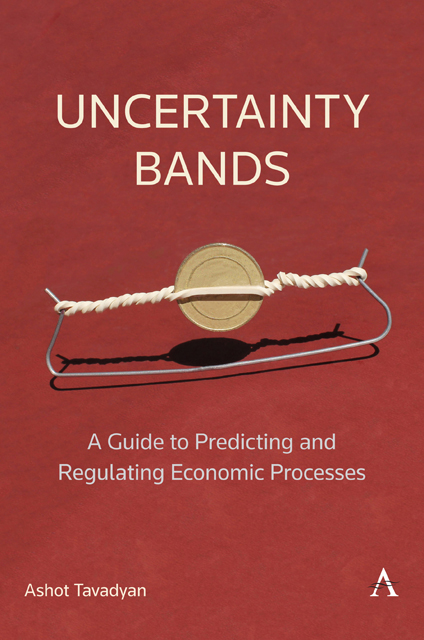Book contents
- Frontmatter
- Contents
- Preface
- Introduction: The Philosophy of Economic Forecasting
- 1 Interval Links in Economy and the Capabilities of Quantitative Thinking
- 2 The Possibilities for Forecasting Economic Indicators
- 3 The Principle of the Minimal Uncertainty Interval
- 4 The Intervals of Key Economic Indicators
- 5 Key Principles of Economic Regulation
- Conclusion
- Appendix: The Uncertainty Relations of Economic Indicators
- Acknowledgments
- Index
- Frontmatter
- Contents
- Preface
- Introduction: The Philosophy of Economic Forecasting
- 1 Interval Links in Economy and the Capabilities of Quantitative Thinking
- 2 The Possibilities for Forecasting Economic Indicators
- 3 The Principle of the Minimal Uncertainty Interval
- 4 The Intervals of Key Economic Indicators
- 5 Key Principles of Economic Regulation
- Conclusion
- Appendix: The Uncertainty Relations of Economic Indicators
- Acknowledgments
- Index
Summary
The role of uncertainty has increased in the economy. The economy shows increased volatility; the frequency of changing situations and policies can rapidly change the economic landscape, thus giving them a new quality.
An economy does not develop along with programmed principles. The economic, social and political situations and the market, as well as international economic relationships, are variable. Economic regulation oftentimes requires substantial adjustments demanding readiness, which can be achieved using the intervals of economic indicators.
In a transforming economy, the issue of uncertainty is even more urgent, while the aftermath of unpredictability and an unfeasibility of precision forecasting the economic processes may be even more sensitive. The transforming economies are the states staging the process of transforming the command economy into the market economy. The economic regulation constantly changes in those countries. This is reflected in the key economic indicators characterizing the country's development. The level of uncertainty is higher, especially in transforming economies, and the likelihood of forecast fulfillment is lower. Uncertainty intervals for forecasting are wider in those countries as they have more sensitivity thresholds, which are the critical bounds of key economic indicators. The crossing of those thresholds can cause even greater changes than in the developed countries, which have stronger homeostasis of the economic system. For instance, the drop of GDP in transforming economies after the crisis by far exceeds the drop of GDP in developed countries.
Under those conditions, it is rather unproductive to compile static equations to be used in studying the economic processes. Moreover, the number of sensitivity thresholds increases, which changes the elasticity of economic indicators. Besides, the same value of an indicator, say, inflation or an exchange rate, may correspond to very different values of other economic indicators such as GDP, its structure and exports. Thus, those causal links are ambiguous; hence, the forecasts compiled upon unambiguous links will be inadequate for describing economic prospects.
The principles of the economy are mostly identical; however, they are manifested with differing intensities under different conditions and times. Economic diseases, having a universal character, show themselves distinctly in transforming economies. It is especially a small ship coming to be in the process of renovation in heavy seas that encounters quite some unexpected situations.
- Type
- Chapter
- Information
- Uncertainty BandsA Guide to Predicting and Regulating Economic Processes, pp. vii - xPublisher: Anthem PressPrint publication year: 2022



